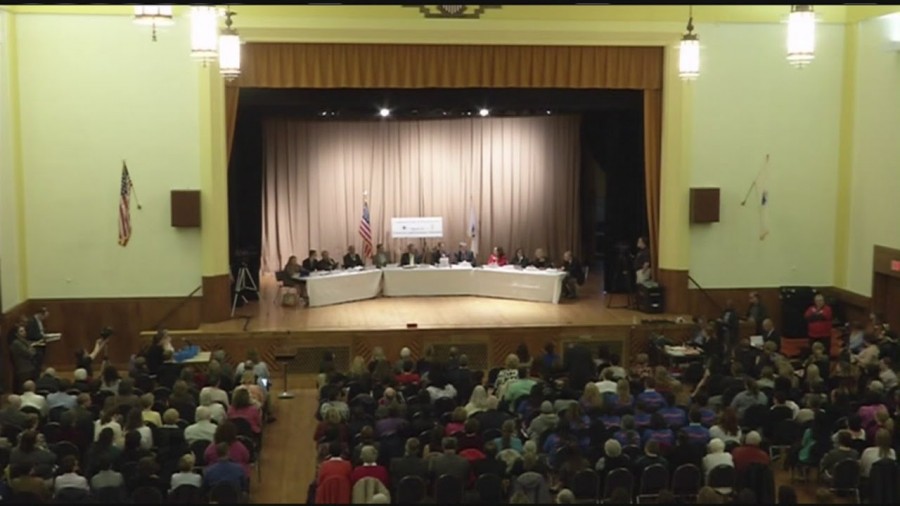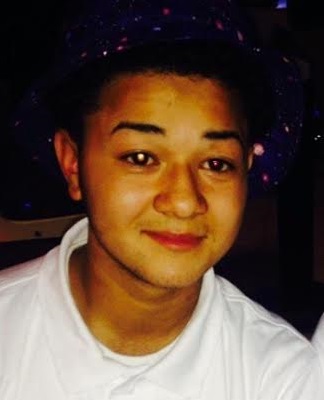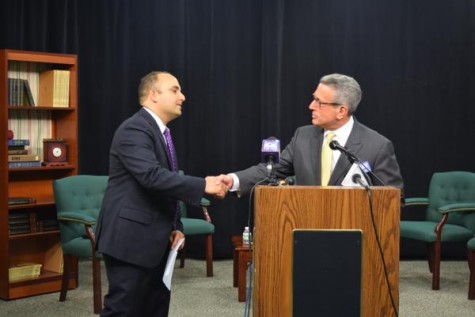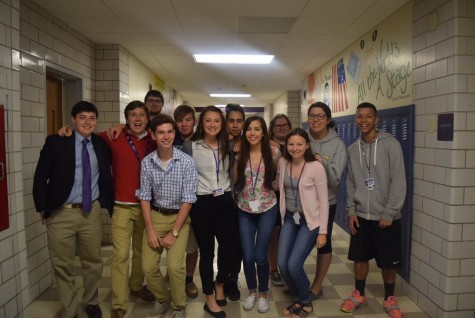A Student’s Take on Receivership
As Holyoke residents weigh the pros and cons of receivership and look toward the future, The Herald’s editor-in-chief shares her thoughts.
The Board of Education sits on stage, as a packed house from floor to balcony make their voices heard.
As Editor in Chief of The Herald, I find it necessary to comment on the happenings of the past few days. As many of you are likely aware, last week the Holyoke Public School District was taken into state receivership by an 8-3 vote, per the recommendation of the Department of Elementary and Secondary Education (DESE) Commissioner, Mitchell Chester.

On Monday April 27, a public forum was held with all eleven Board of Elementary and Secondary Education (BESE) members present so that they could hear the community’s take on the issue. The War Memorial was packed, with over 800 people in attendance. Representatives were randomly chosen out of four categories to make a statement to the board: Holyoke students, Holyoke parents, Holyoke teachers/faculty, and community members.
The event was roughly four hours long and all speakers had only 3 minutes to speak their peace, making for there to be roughly 80 speakers that night. Of those, only two spoke in agreement of receivership and came from the Holyoke Charter Schools, which are currently looking for the “charter cap” to be lifted, allowing more students, and state funding, to come into these essentially private schools (the principal never outright identified herself, but heavily lobbied on behalf of charter schools). All other speakers spoke heavily against a state takeover, citing that one of the main problems Holyoke faces is not poor education, but a poor community.
This “state takeover”, as the receivership has been dubbed, is truly taking over not only our schools, but also some of our fundamental democratic rights. With their decision, the Commonwealth of Massachusetts’s DESE has taken away the right of Holyoke citizens to “have their common consent” given, the very definition of what a commonwealth is and what citizens of one are entitled to have, a deeper definition than just “state”. Holyoke voters themselves pick their school committee members. We give our common consent as to whom we believe will use their abilities to their utmost potential to better not only our MCAS scores and dropout/graduation rates (criteria that DESE bases most of their decisions on), but to better our students and the community.
I also find it extremely telling that of all the eleven board members, only two actually visited the schools they were voting on. Would you buy a car without test driving it, merely trusting the statistics given, saying “that’s all that really matters”? For the most part, these appointed, not elected, board members do not seem to be using their abilities to their utmost potential, making one-dimensional determinations for multi-dimensional issues that can easily be explored further with a quick day trip.
 One of the two board members who actually visited schools, Mary Ann Stewart, expressed her disappointment and shock with her colleagues for not visiting the district during Tuesday’s meeting. The other member, State Student Advisory Council chair Donald Willyard visited Holyoke High, where he saw great programs in place, such as free breakfast (the most important meal of the day). Willyard fully believed that under new Holyoke Superintendent Dr. Sergio Paez’s leadership, the district was making a change for the better, “improving both substantially and incrementally.”
One of the two board members who actually visited schools, Mary Ann Stewart, expressed her disappointment and shock with her colleagues for not visiting the district during Tuesday’s meeting. The other member, State Student Advisory Council chair Donald Willyard visited Holyoke High, where he saw great programs in place, such as free breakfast (the most important meal of the day). Willyard fully believed that under new Holyoke Superintendent Dr. Sergio Paez’s leadership, the district was making a change for the better, “improving both substantially and incrementally.”
Are there solutions to the issues in the Holyoke schools that the state can bring to the table? Overwhelmingly, the answer seems to be no.
At Holyoke High, there are various causes behind student success and “underperformance” (as the DESE sees it, low test scores and high dropout rates). The major ones I am able to see from students are apathy towards their education, outside factors that culminate in poor classroom performance, and unequal knowledge bases from previous education that disallows a student from understanding a new concept.
Frankly, not all students seem to value education, and student motivation is a huge hurdle to success in Holyoke. I see everyday how my teachers interact with students, trying and often succeeding in teaching them and pushing their minds. It is often not students’ priority to do well in school, as they may see it as a waste of time or face other issues that may make it difficult to learn. The teachers we have are aware of these factors, and may have faced them themselves, as many are from Holyoke, making the teachers we have here already the best qualified for the job.
As the state is soon going to find out, it is very difficult to force someone to care about their education. All you can do is try to show one the intrinsic, permanent value of knowledge. A student will become involved in their education once they realize this value.
How can education become a priority? Perhaps once we address that “poverty is not an abstract,” as Holyoke Teachers Association President Gus Morales said at Monday’s meeting, and thus should not be treated as such. “I find it so troubling that so often I hear, ‘Poverty is not an excuse’. What I’d like to see is how can we address the well-being of the students of Holyoke, and not just the test scores,” he adds.
Lana, a low-income parent of three special needs children, also made a statement at that meeting. “When you are attempting to assist any population in making positive changes, you must first possess empathy for the problems that society is facing. You must possess knowledge of their culture.” She went on to explain how the Board does not see our children every day, but only sees our district by the numbers, by our test scores, graduation rate, and requests for special needs assistance. The Board does not walk our halls to see the struggles of the students, of the teachers, and also the successes of the students, and of the teachers. “Therefore I do not believe that the state board of education is qualified to lead our children to success.”
I find it ironic that the Board is able to look at our test scores and other data relevant to education and determine that we are “chronically underperforming”, yet when they look at the socioeconomic numbers of our city, with 49% of Holyoke children living in poverty, they refuse to acknowledge such a correlation between home life and education. Instead, as one board member Vanessa Calderón-Rosado said, her “heart sank” as she heard that these poverty levels were what Holyokers placed the most blame on. It truly sinks our hearts too, but instead the state refuses to acknowledge, “Hey, maybe if a kid can’t sleep because of bugs crawling all over him, or because she can’t get to school because her parent’s paycheck doesn’t come in until Thursday and she can’t afford to take the bus, they won’t be doing too well in school, don’t cha think?”
Demotivation is also a major influence on students’ learning. If a student didn’t know how to even speak English, much less read or write it, until the third grade, they are obviously not going to do well on a spelling test, or the MCAS. Holyoke has been working to change that, with the Holyoke Early Literacy Initiative (HELI) partnering parents with educators to help them teach their children how to read at the proficient level by the third grade. It is programs like this, implemented recently by former superintendent Dr. Paez, that are working to better education to curb that discouragement and that “I don’t know what’s going on,” helpless feeling that students can get and can make them disengage and lose the motivation to learn.

“In Lawrence, you were invited to take receivership. You weren’t invited to take receivership of Holyoke,” Holyoke resident Paul Lusignan stated at Monday’s meeting. The state board of education has pushed its way into a community that, for the majority of people who do care, do not want a state takeover. Now not only does the board have to deal with “chronically underperforming” students, but a hostile community. The state has come in without an outright plan, without an outright leader (Chester plans to announce a receiver for the schools by the end of May. Until then, Dr. Paez is still running day-to-day operations, but cannot make any decisions without running it by the commissioner), and seemingly without a good grip on the diverse community we live in.
However, the decision has been made and I do have some hopes for the future, though I wish that instead of outright receivership, perhaps a partnership could have been created between the state and our school district. If there is one thing the state can bring in, it is funding and other resources than can aid our district.
Perhaps new programs, such as community outreach centers, mentoring programs, and “Homework Houses” can continue to grow or come to fruition in Holyoke to aid and better students not only on tests, but in the real world and their later lives. Our children are the future.
I hope that the Commissioner and Board appoint a qualified, open-minded, and understanding receiver for Holyoke, one who can aid in the further achievement of our students, and most of all, provide hope for not only our school district’s, but for our city’s future. If there is something that our community needs more than anything at this point, it is hope.














Susan Mulvaney • May 13, 2015 at 10:52 pm
Very well written article!
Mary Birks • May 12, 2015 at 10:25 am
An impressive, well-written article. I look forward to reading more of your writing.